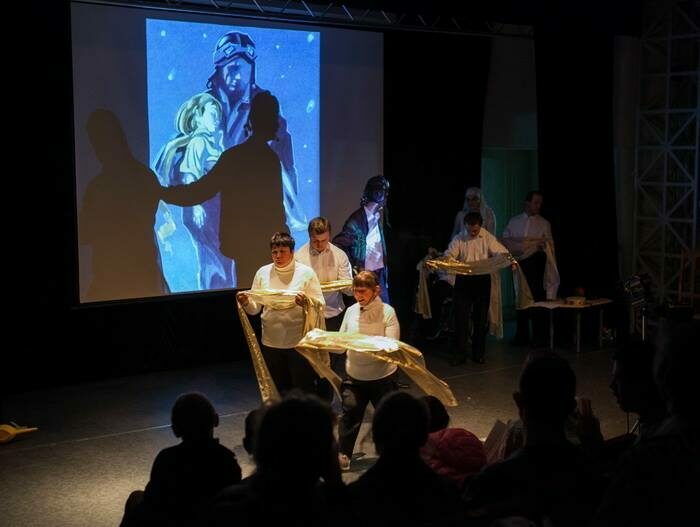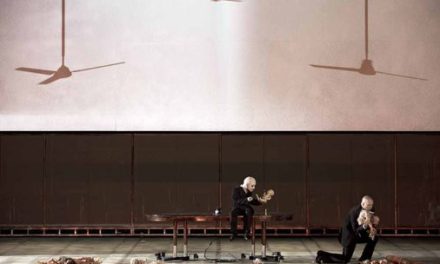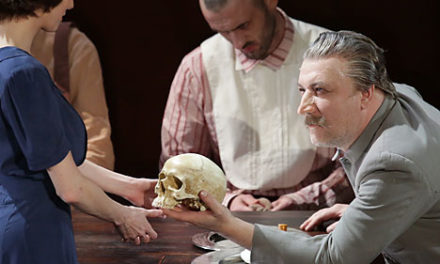The importance of including people with disabilities in active public life is a keenly discussed topic. The equality of disabled people is undoubtedly a global problem, but it is a big shame that Belarusian society is very intolerant against people with disability. Although there is a huge amount of problems disabled people have to face in their everyday life, the power of art (and theatre in particular) can divert them from their burden. This is why the accessibility of theatres for disabled people is one of those delicate problems the Belarusian society has to solve.
Taking into account the actual state of barrier-free theatre, the overall situation is not that bad. There are small theatre companies and private theatrical initiatives that do create either barrier-free theatres or involve disabled actors in their stage productions. However, there just a few theatres which involve disabled actors (The Joy Theatre and Team Theatre are the most noticeable). That’s why the work of these theatres is extremely important.
The oldest theatre, which has done the most notable job in terms of barrier-free theatre is the inclusive theater, The Joy Theatre, founded by Belarusian actor and TV host Alexander Zhdanovich more than a decade ago. The story of this theatre has begun about fourteen years ago when Alexander Zhdanovich visited the boarding school for children with special needs, that is located in Novinki township. There were children with Down syndrome and cerebral palsy, as well as kids with intellectual lag. Alexander has started to make stage performances for children from this boarding school. Gradually the boarding students began to participate in Alexander’s stagings which has marked the birth of The Joy inclusive theatre.
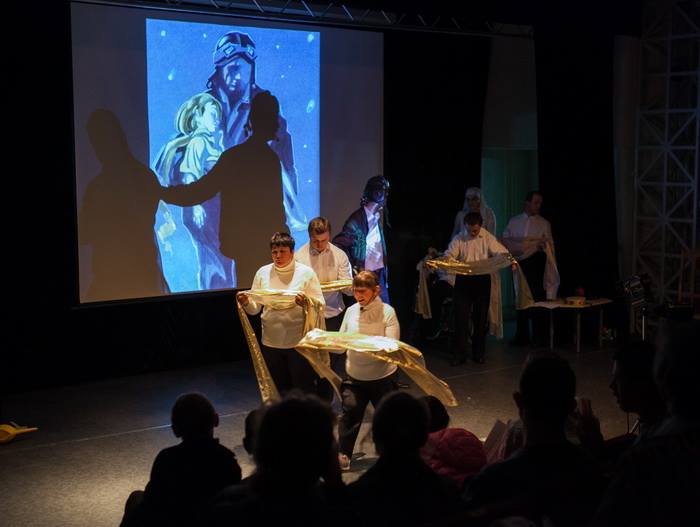
The Little Prince by The Joy Theatre. Photo Courtesy of The Joy Theatre
The most renowned performance of this theatre is The Little Prince based on the famous novella by Antoine De Saint Exupery. This stage play is about universal human values: love and friendship. This performance was shown several times; at the Children’s Education Center of St. Elisabeth Monastery, on the small stage of the Gorky Theater, in the Minsk Concert Hall, and on the stage of the Youth Variety Theater. Unfortunately due to provision problems mentioned above the last The Little Prince show was held by The Joy on October 2, 2018.
There is no permanent staff and repertoire, nor a clear schedule of rehearsals in this theatre. The Joy Theatre strives to give theatrical performances several times a year. But due to fundraising needs, and the absence of regular stage and rehearsal studio The Joy Theatre stagings are not so often. Unfortunately neither questions of theatre and disability, nor theatrical art-therapy is common for local theatre community, which only makes the work of Alexander Zhdanovich even more important in today’s Belarus.
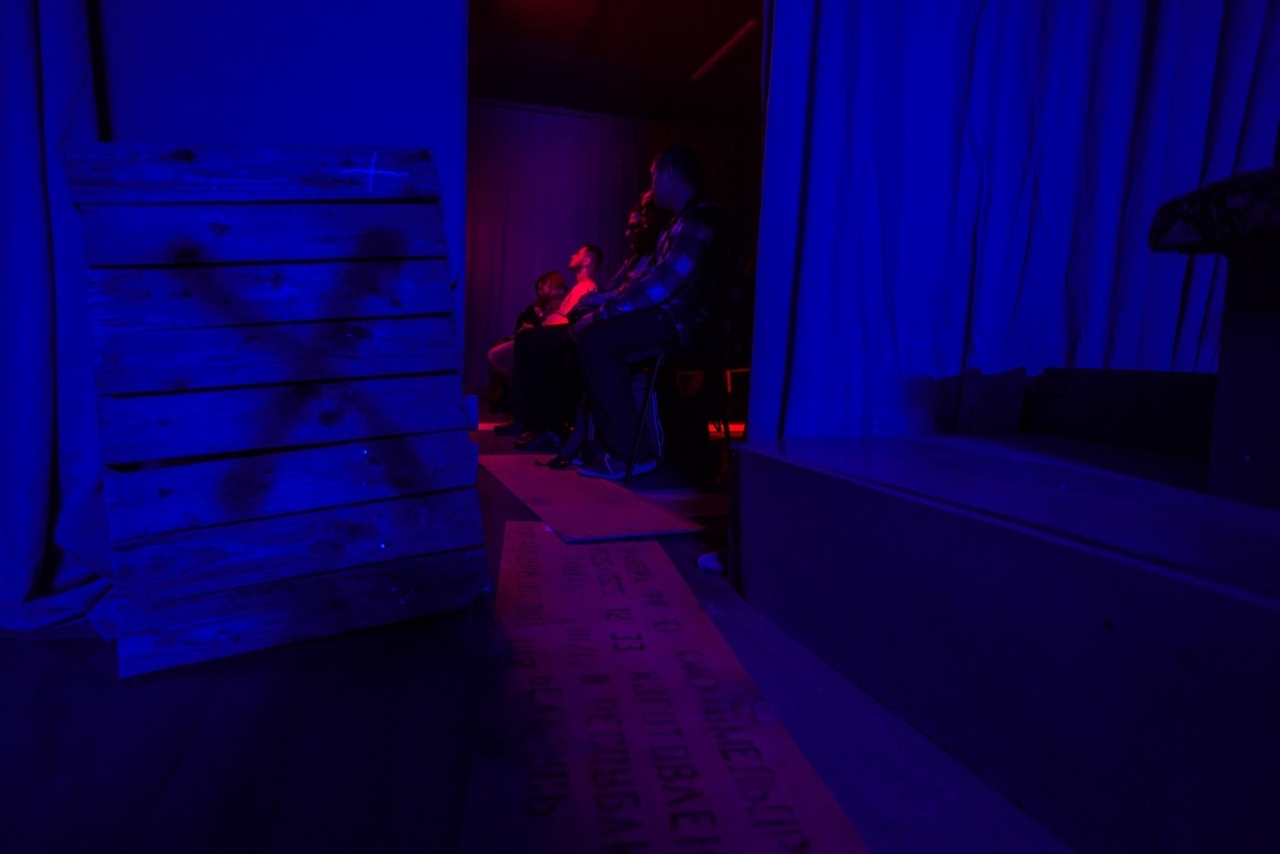
Ghosts by Team Theatre. Photo Courtesy of Team Theatre.
Most recent theatrical initiative for disabled people in Belarus is Gomel-based, Team theatre, and a charity fund Razam Tut (“Together here” in Belarusian) organized by the theatre crew. The Team Theatre aim is to create a truly barrier-free theater with performances for literally everyone. Trademark stage shows of the Team theatre are so-called atmospheric performances (aimed at the blind audience) in which the ordinary viewers’ eyes are blindfolded. There are performances of silence aimed at the deaf and hard of hearing the audience. Also, the Team Theater’s stage is equipped with ramps and walkways, convenient for lifting, lowering and driving in a wheelchair.
This subjective side of theatrical life – the accessibility of theatres’ buildings for the disabled people is a huge problem in Belarus since there are just a couple theatres all over the country which a person with musculoskeletal and neurological problems can easily visit. Being a disabled person myself (I have spinal cord neurodegenerative disorder), I can prove that the vast majority of declared local barrier-free environment achievements is just a myth. If your health issues limit your mobility, you can’t visit any theatre show you’d like to see.
It is important to note that not only the viewers with health issues are limited in their choice of what theatre show to visit, but the actors with disability are limited with the choice of what to play. Disabled actors aren’t seen on the big stages – none of the state theatres will give a disabled actor a part. Even if the staged play features disabled characters, these characters will be played by non-disabled actors.
And the last, but not least, factor is that the number of plays that covers equality of people with disability is too little. The contemporary Belarusian drama usually settles a mob as a hero. For instance, in the play From the Professional School the protagonist murders a boy with Down syndrome, and does not regret what he did. In fact, the audience sees the playwright’s bigoted message about intolerance against disabled people.
On the other hand, there is playwright Lyoha Chykanas, who positively covers the topic of disability and the needs of disabled people. The play I Do Not Need Sex features the story which is based on the real events of a paralyzed Diman. The other play – Two unnecessary, the Third One is Too Much covers the life of a person with multiple sclerosis.
At the same time, though Lyoha Chykanas is a well-known and competent contemporary Belarusian playwright, his works about disability are undervalued. Contemporary Belarusian audience prefers to see the stories which do not make them think. That’s why local stage will presents stories where a protagonist murders a defenseless kid with Down syndrome and yet refuses to show the audience the stories of paralyzed Diman or Elena with multiple sclerosis.
Summarizing the above, it’s impossible to make an unambiguous conclusion. The involvement of disabled children and adults in theatrical activities exist which is definitely a positive thing. However, disability isn’t covered enough by Belarusian theatres. Local venues are hard to reach if you have health issues, and the plays that talk about equality of handicapped people are too rare on the local stages. If a play that covers disability happens on Belarusian stage, the disabled characters will be played by non-disabled actors, although there are several professional disabled actors, who could play this character way better than a non-disabled actor because of their life experience.
Off course the art of theatre should not be only about disability. Anyone could argue that there are way more serious problems for disabled people than the possibility to play on stage or to visit a theatre show. However, art is the biggest mind-changing tool. Through the art, it might be possible to change the existing paradigm of Belarusian society – the paradigm of unwillingness, ignorance, and inability to empathize with the disabled. There is a famous quote from Mikhail Bulgakov’s novel Heart of a Dog: “Devastation is something that starts in people’s heads.” Those borders between disabled and non-disabled persons (overcoming of which is the essence of a barrier-free environment) are in people’s heads. When the everyday environment is full of ignorant people who are intolerant against disabled persons, no technical device can make a person with health issues feel himself (or herself). And the accessibility to art is one of the critical turning points. The power of art can destroy that “devastation” Bulgakov wrote about. All of the existing barriers will start to vanish when there will be an understanding of the benefits of equality for everybody, themselves included. And the power of art is decisive in this matter.
This post was written by the author in their personal capacity.The opinions expressed in this article are the author’s own and do not reflect the view of The Theatre Times, their staff or collaborators.
This post was written by Alexander Mantush.
The views expressed here belong to the author and do not necessarily reflect our views and opinions.

